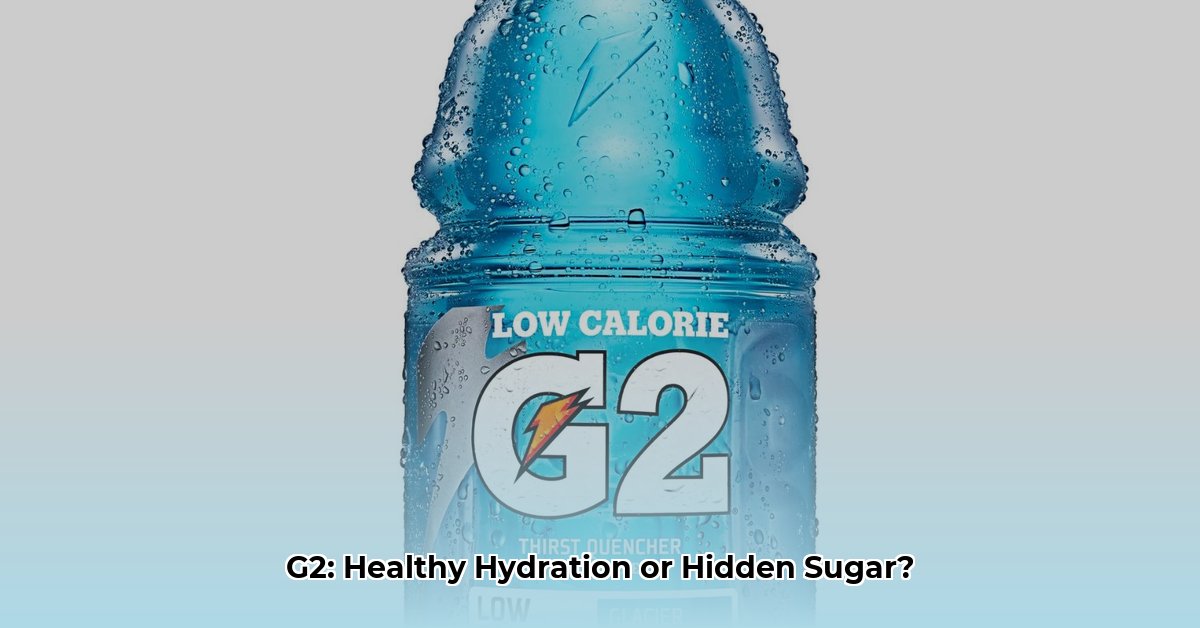This article provides a comprehensive overview of Gatorade G2’s nutritional content, ingredients, and its role in hydration. We’ll compare G2 to regular Gatorade, discuss the use of artificial sweeteners, and answer frequently asked questions. Information is current as of October 26, 2024.
G2 Nutrition Facts: A Close-Up Look
Here’s a detailed look at the nutrition facts for a 20-ounce bottle of Fruit Punch G2. Nutritional content can vary slightly between flavors, so always check the product label.
| Nutrient | Amount Per Serving | % Daily Value* |
|---|---|---|
| Calories | 50 | 2% |
| Total Fat | 0g | 0% |
| Saturated Fat | 0g | 0% |
| Trans Fat | 0g | |
| Cholesterol | 0mg | 0% |
| Sodium | 270mg | 12% |
| Potassium | 75mg | 2% |
| Total Carbohydrate | 12g | 4% |
| Total Sugars | 12g | 24% |
| Added Sugars | 12g | 24% |
| Protein | 0g | 0% |
*Percent Daily Values are based on a 2,000 calorie diet.
Ingredient Breakdown: What’s Inside G2?
Understanding the ingredient list is key to making informed choices. Here’s a breakdown of common G2 flavors:
- Fruit Punch: Water, sucrose syrup, dextrose, citric acid, sodium citrate, monopotassium phosphate, natural and artificial flavors, sucralose, acesulfame potassium, red 40, blue 1.
- Lemon Lime: Water, sucrose syrup, dextrose, citric acid, natural flavor, sodium citrate, monopotassium phosphate, sucralose, acesulfame potassium, yellow 5.
- Glacier Freeze: Water, sucrose syrup, dextrose, citric acid, natural and artificial flavor, sodium citrate, monopotassium phosphate, sucralose, acesulfame potassium, blue 1.
Flavor Variations: Slight Nutritional Differences
While the core ingredients are similar, nutritional values, especially sugar content, can vary slightly between flavors. Always check the specific product label for the most accurate information.
G2 vs. Gatorade: A Side-by-Side Comparison
G2 is marketed as a lower-sugar alternative to regular Gatorade. This chart highlights the key differences:
| Feature | G2 (20 oz) | Regular Gatorade (20 oz) |
|---|---|---|
| Calories | ~50 | ~140 |
| Sugar | ~12g | ~36g |
| Sodium | ~270mg | ~450mg |
| Potassium | ~75mg | ~150mg |
G2 offers a substantial reduction in calories and sugar while still providing electrolytes.
Artificial Sweeteners: Benefits and Considerations
G2 contains sucralose and acesulfame potassium, artificial sweeteners that contribute to its lower calorie and sugar content. While generally recognized as safe by regulatory bodies, some research suggests potential long-term health impacts. More research is needed to fully understand these effects. Consumers concerned about artificial sweeteners should consult with a healthcare professional and consider alternative hydration options.
Hydration and Electrolytes: The Science Behind It
Electrolytes, such as sodium and potassium, are lost through sweat. These minerals are crucial for maintaining fluid balance, nerve function, and muscle contractions. G2 is designed to help replenish these lost electrolytes, aiding in hydration, especially after exercise.
Frequently Asked Questions (FAQs)
- Is Gatorade G2 good for you? G2 can be beneficial after intense exercise, but water should be your primary hydration source. Daily consumption of G2 isn’t typically recommended due to added sugars and artificial sweeteners.
- How much sugar is in G2? Approximately 12 grams per 20-ounce serving, varying slightly between flavors. Always check the label.
- Can I drink G2 every day? It’s generally not necessary unless you’re consistently engaging in strenuous activity. Prioritize water for daily hydration.
- What are some alternatives to G2? Water is the best choice for everyday hydration. Other options include electrolyte-infused water (homemade or commercially available), coconut water (naturally contains electrolytes), and diluted fruit juice.
Have More Questions?
We encourage you to share your experiences with G2 and ask any further questions in the comments below. We’re committed to providing accurate and helpful information to support your hydration and health goals.
- Food Making Kits Bring Easy, Fun Homemade Dishes to Your Kitchen - February 5, 2026
- Cooking Kits Make Mastering New Recipes Fun for Everyone - February 4, 2026
- Leak-Proof Glass Food Containers with Locking Lids Keep Food Fresh - February 3, 2026










